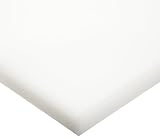All Categories


UHMW (Ultra High Molecular Weight) Polyethlylene Sheet, White, 1/4" Thick, 12" Width, 24" Length
Share Tweet
*Price and Stocks may change without prior notice
*Packaging of actual item may differ from photo shown
- Electrical items MAY be 110 volts.
- 7 Day Return Policy
- All products are genuine and original
- Cash On Delivery/Cash Upon Pickup Available








UHMW (Ultra High Molecular Weight) Polyethlylene Features
-
UHMW is an impact-, chemical-, and moisture-resistant plastic with a low-friction surface, better abrasion resistance than PTFE, and more rigidity than other polyethylenes
-
Color is opaque white
-
Meets ASTM D4020 specifications
-
Standard tolerance
About UHMW (Ultra High Molecular Weight) Polyethlylene
The opaque white UHMW sheet has a standard tolerance and meets American Society for Testing and Materials ASTM D4020 specifications. UHMW (ultra high molecular weight) polyethylene is an impact-, chemical-, and moisture-resistant plastic that has excellent abrasion resistance and a low-friction surface. UHMW is more rigid than LDPE and HDPE, and has better abrasion resistance than PTFE. Plastic refers to a group of synthetic or semi-synthetic materials that have been engineered to achieve specific properties. The most notable characteristics of plastics are its low weight, machinability, corrosion resistance, and typically good thermal and electrical insulating properties. Certain plastic grades also offer optical transparency similar to glass, low-friction or self-lubricating surfaces, and exceptional impact resistance. Depending on their properties, certain plastic grades can be used as alternatives to metal, glass, and ceramic. Unlike metal, plastic may experience creep, which is deformation caused by longtime exposure to a constant load. Tensile strength, used to indicate the material’s overall strength, is the peak stress it can withstand before it breaks. Corrosion resistance describes the material's ability to prevent deterioration caused by atmosphere, moisture, or other medium. Wear resistance indicates the ability to prevent surface damage caused by contact with other surfaces. Toughness describes the material's ability to absorb energy before breaking, while hardness (commonly measured as indentation hardness) describes its resistance to permanent surface deformation. Impact resistance is the measure of a material’s ability to absorb a shock of energy before breaking.





















